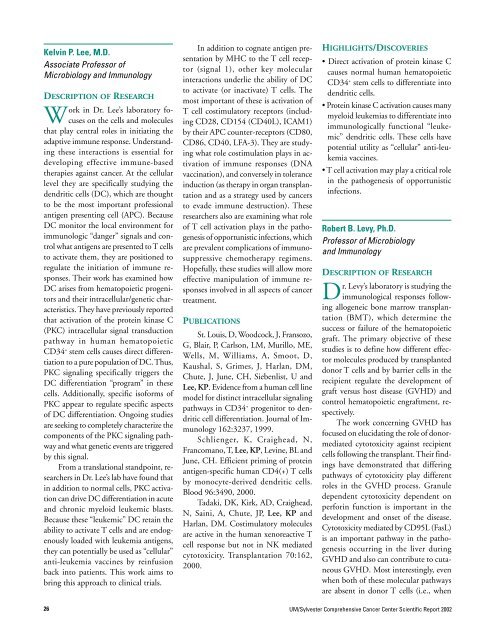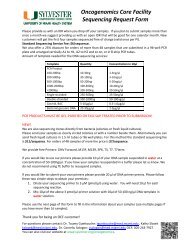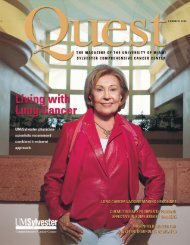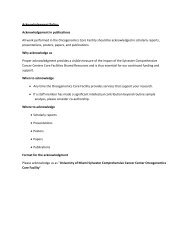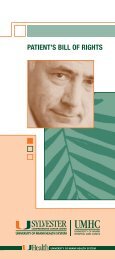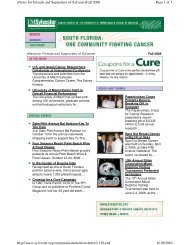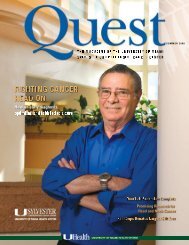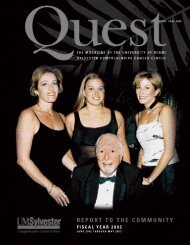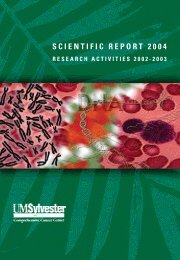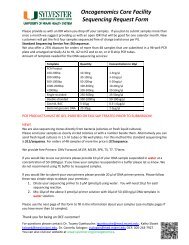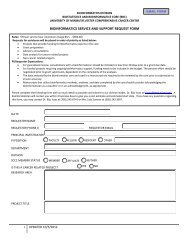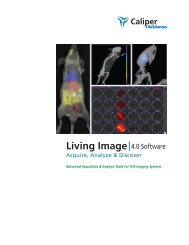tumor cell biology program - Sylvester Comprehensive Cancer Center
tumor cell biology program - Sylvester Comprehensive Cancer Center
tumor cell biology program - Sylvester Comprehensive Cancer Center
Create successful ePaper yourself
Turn your PDF publications into a flip-book with our unique Google optimized e-Paper software.
Kelvin P. Lee, M.D.<br />
Associate Professor of<br />
Micro<strong>biology</strong> and Immunology<br />
DESCRIPTION OF RESEARCH<br />
Work in Dr. Lee’s laboratory focuses<br />
on the <strong>cell</strong>s and molecules<br />
that play central roles in initiating the<br />
adaptive immune response. Understanding<br />
these interactions is essential for<br />
developing effective immune-based<br />
therapies against cancer. At the <strong>cell</strong>ular<br />
level they are specifically studying the<br />
dendritic <strong>cell</strong>s (DC), which are thought<br />
to be the most important professional<br />
antigen presenting <strong>cell</strong> (APC). Because<br />
DC monitor the local environment for<br />
immunologic “danger” signals and control<br />
what antigens are presented to T <strong>cell</strong>s<br />
to activate them, they are positioned to<br />
regulate the initiation of immune responses.<br />
Their work has examined how<br />
DC arises from hematopoietic progenitors<br />
and their intra<strong>cell</strong>ular/genetic characteristics.<br />
They have previously reported<br />
that activation of the protein kinase C<br />
(PKC) intra<strong>cell</strong>ular signal transduction<br />
pathway in human hematopoietic<br />
CD34 + stem <strong>cell</strong>s causes direct differentiation<br />
to a pure population of DC. Thus,<br />
PKC signaling specifically triggers the<br />
DC differentiation “<strong>program</strong>” in these<br />
<strong>cell</strong>s. Additionally, specific isoforms of<br />
PKC appear to regulate specific aspects<br />
of DC differentiation. Ongoing studies<br />
are seeking to completely characterize the<br />
components of the PKC signaling pathway<br />
and what genetic events are triggered<br />
by this signal.<br />
From a translational standpoint, researchers<br />
in Dr. Lee’s lab have found that<br />
in addition to normal <strong>cell</strong>s, PKC activation<br />
can drive DC differentiation in acute<br />
and chronic myeloid leukemic blasts.<br />
Because these “leukemic” DC retain the<br />
ability to activate T <strong>cell</strong>s and are endogenously<br />
loaded with leukemia antigens,<br />
they can potentially be used as “<strong>cell</strong>ular”<br />
anti-leukemia vaccines by reinfusion<br />
back into patients. This work aims to<br />
bring this approach to clinical trials.<br />
In addition to cognate antigen presentation<br />
by MHC to the T <strong>cell</strong> receptor<br />
(signal 1), other key molecular<br />
interactions underlie the ability of DC<br />
to activate (or inactivate) T <strong>cell</strong>s. The<br />
most important of these is activation of<br />
T <strong>cell</strong> costimulatory receptors (including<br />
CD28, CD154 (CD40L), ICAM1)<br />
by their APC counter-receptors (CD80,<br />
CD86, CD40, LFA-3). They are studying<br />
what role costimulation plays in activation<br />
of immune responses (DNA<br />
vaccination), and conversely in tolerance<br />
induction (as therapy in organ transplantation<br />
and as a strategy used by cancers<br />
to evade immune destruction). These<br />
researchers also are examining what role<br />
of T <strong>cell</strong> activation plays in the pathogenesis<br />
of opportunistic infections, which<br />
are prevalent complications of immunosuppressive<br />
chemotherapy regimens.<br />
Hopefully, these studies will allow more<br />
effective manipulation of immune responses<br />
involved in all aspects of cancer<br />
treatment.<br />
PUBLICATIONS<br />
St. Louis, D, Woodcock, J, Fransozo,<br />
G, Blair, P, Carlson, LM, Murillo, ME,<br />
Wells, M, Williams, A, Smoot, D,<br />
Kaushal, S, Grimes, J, Harlan, DM,<br />
Chute, J, June, CH, Siebenlist, U and<br />
Lee, KP. Evidence from a human <strong>cell</strong> line<br />
model for distinct intra<strong>cell</strong>ular signaling<br />
pathways in CD34 + progenitor to dendritic<br />
<strong>cell</strong> differentiation. Journal of Immunology<br />
162:3237, 1999.<br />
Schlienger, K, Craighead, N,<br />
Francomano, T, Lee, KP, Levine, BL and<br />
June, CH. Efficient priming of protein<br />
antigen-specific human CD4(+) T <strong>cell</strong>s<br />
by monocyte-derived dendritic <strong>cell</strong>s.<br />
Blood 96:3490, 2000.<br />
Tadaki, DK, Kirk, AD, Craighead,<br />
N, Saini, A, Chute, JP, Lee, KP and<br />
Harlan, DM. Costimulatory molecules<br />
are active in the human xenoreactive T<br />
<strong>cell</strong> response but not in NK mediated<br />
cytotoxicity. Transplantation 70:162,<br />
2000.<br />
HIGHLIGHTS/DISCOVERIES<br />
• Direct activation of protein kinase C<br />
causes normal human hematopoietic<br />
CD34 + stem <strong>cell</strong>s to differentiate into<br />
dendritic <strong>cell</strong>s.<br />
• Protein kinase C activation causes many<br />
myeloid leukemias to differentiate into<br />
immunologically functional “leukemic”<br />
dendritic <strong>cell</strong>s. These <strong>cell</strong>s have<br />
potential utility as “<strong>cell</strong>ular” anti-leukemia<br />
vaccines.<br />
• T <strong>cell</strong> activation may play a critical role<br />
in the pathogenesis of opportunistic<br />
infections.<br />
Robert B. Levy, Ph.D.<br />
Professor of Micro<strong>biology</strong><br />
and Immunology<br />
DESCRIPTION OF RESEARCH<br />
Dr. Levy’s laboratory is studying the<br />
immunological responses following<br />
allogeneic bone marrow transplantation<br />
(BMT), which determine the<br />
success or failure of the hematopoietic<br />
graft. The primary objective of these<br />
studies is to define how different effector<br />
molecules produced by transplanted<br />
donor T <strong>cell</strong>s and by barrier <strong>cell</strong>s in the<br />
recipient regulate the development of<br />
graft versus host disease (GVHD) and<br />
control hematopoietic engraftment, respectively.<br />
The work concerning GVHD has<br />
focused on elucidating the role of donormediated<br />
cytotoxicity against recipient<br />
<strong>cell</strong>s following the transplant. Their findings<br />
have demonstrated that differing<br />
pathways of cytotoxicity play different<br />
roles in the GVHD process. Granule<br />
dependent cytotoxicity dependent on<br />
perforin function is important in the<br />
development and onset of the disease.<br />
Cytotoxicity mediated by CD95L (FasL)<br />
is an important pathway in the pathogenesis<br />
occurring in the liver during<br />
GVHD and also can contribute to cutaneous<br />
GVHD. Most interestingly, even<br />
when both of these molecular pathways<br />
are absent in donor T <strong>cell</strong>s (i.e., when<br />
26<br />
UM/<strong>Sylvester</strong> <strong>Comprehensive</strong> <strong>Cancer</strong> <strong>Center</strong> Scientific Report 2002


